The Liberia Anti-Corruption Commission and partners, UNDP, have taken their anti-corruption crusade to a whole new level, drawing praises from locals in Bong and Lofa Counties.
After a successful climax of another training on social accountability in Lofa County, participants were left in awe of the LACC for organizing such a massive training in their county.
For three days, participants were drilled through crucial topics, including; understanding the whistleblower Act, Witness Protection Act, Civil Society and Community Based Organizations’ participation in the government budget preparation process and transparency and accountability mechanisms.
Held in Voinjaima, Lofa County, the training was done under the ‘Empowering Citizens and Communities to Foster Social Accountability and Transparency in Governance and Public Service Delivery’, project.
The project is targeting all the fifteen Counties of Liberia and is being implemented by the Liberia Anti-Corruption Commission with support from the UNDP through the Peacebuilding Fund.
At the formal close of the training, an official of the local government in Lofa, Methuselah Gbigbi told the gathering that extension of the LACC social accountability project in the County was welcoming and timely.
Mr. Gbigbi, who is an Administrative Assistant to Superintendent Lavala Massaquoi, believes Lofa, like any other county, has suffered the impact of corruption over the years. He assured the Superintendent and local government’s commitment to transparency and accountability.
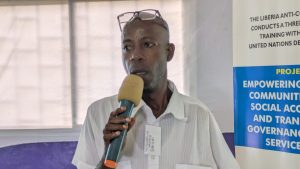
METHUSELAH GBIGBI
Mr. Gbigbi was joined by an array of other speakers from local communities and groups in Lofa County. Kortu R. Wieleh of the Group of 77 lauded the LACC and partners for taking the training to the County. “We, in the disabled community are very happy about this initiative and we can promise you that all that we have learned here today will be put to practice in our respective communities” ma Korto noted, stressing the importance of awareness because her community is one group that suffers most from the impact of corruption.
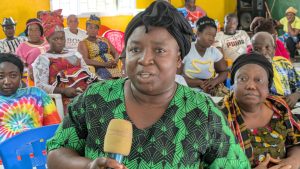
Ma Korto Wieleh
For Patrick Tamba and Alice Akoi of the Civil Society, the fight against corruption should be holistic, bringing everyone together with the goal of defeating it. They assured the local civil society’s commitment to helping LACC and partners in helping to prevent and report corruption in Lofa County.
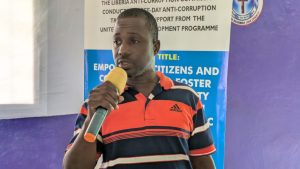
PATRICK TAMBA
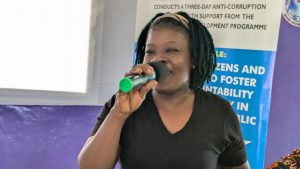
ALICE AKOI
Madam Deddeh K. Kanmoh is heading the National Rural Women of Liberia, Lofa County structure. Throughout the workshop, her views against corruption were clear and unequivocal. She believes, it is high time, citizens begin to ask political leaders the tough questions about the stewardship. Madam Kanmoh stressed that certain laws are weak and must be changed if government is serious about fighting corruption. She joined other previous speaking by pleading for non-political interference in the work of the LACC.
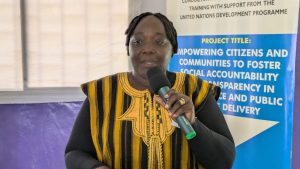
DEDDEH KANMOH
Earlier, the Liberia Anti-Corruption Commission rallied the cooperation of Lofa citizens in the fight against corruption. LACC Prevention Officer John Tommy said only a collective fight will ensure success against the menace.
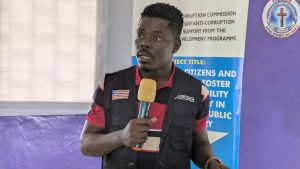
JOHN TOMMY
He challenged participants to use knowledge gained from the training to always report any suspicious acts of corruption, noting that silence was no longer an option.
At the same time an official of UNDP has praised the makeup of participants selected for the social accountability training in Voinjaima.
UNDP Civil Society Coordinator, Emmanuel Kollie was particularly pleased that women were dominant among the participants, stating they are the ones who bear the brunch of corruption.
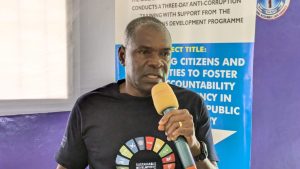
EMMANUEL KOLLIE
The three-day training, held from Wednesday, August 7 to the 9th, 2024, provided an insight into government budget formulation processes and how citizens can influence development in their counties by getting involved in County sittings and holding their leaders accountable for their stewardship. It is expected that these actions will go a long way in preventing corruption and ensuring that duty bearers do the right.

